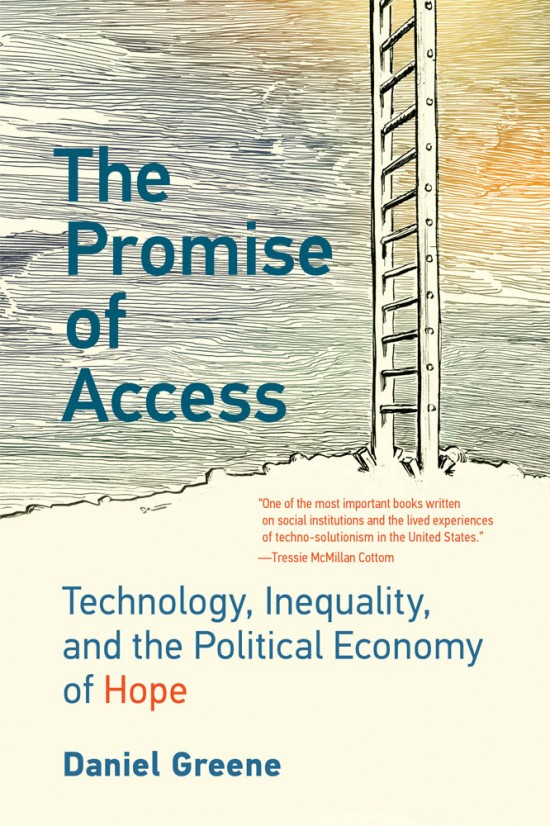Why do we keep trying to solve poverty with technology? What makes us feel that we need to learn to code—or else? In The Promise of Access: Technology, Inequality, and the Political Economy of Hope, Daniel Greene argues that the problem of poverty became a problem of technology in order to manage the contradictions of a changing economy. Greene shows how the digital divide emerged as a policy problem and why simple technological solutions to complex social issues continue to appeal to politicians and professionals who should (and often do) know better.
Greene shows why it is so hard to get rid of the idea—which he terms the access doctrine—that the problem of poverty can be solved with the right tools and the right skills. This way of thinking is so ingrained that is adopted by organizations that fight poverty—which often refashion themselves to resemble technology startups. Drawing on years of fieldwork, Greene explores how this plays out in the real world, examining organizational change in technology startups, public libraries, and a charter school in Washington, DC. He finds that as the libraries and school pursue technological solutions, they win praise and funding but also marginalize and alienate the populations they serve. Greene calls for new political alliances that can change the terms on which we understand technology and fight poverty. The Promise of Access is published by the MIT Press, and available wherever books are sold. It received the McGannon Book Award for the best book published in 2021 concerning media policy, activism, and social justice.
Praise for The Promise of Access “The Promise of Access is one of the most important books written on social institutions and the lived experiences of techno-solutionism in the United States. Dan Greene systematically dismantles the cultural history of technology’s antipoverty promises to reveal, instead, the reality of how uncritical technology ideologies subvert social institutions’ democratic missions. The book is an important addition to STS, critical information studies, and political economy courses.” Tressie McMillan Cottom, Associate Professor of Information and Library Science, University of North Carolina at Chapel Hill; author of Lower Ed: The Troubling Rise of For-Profit Colleges in the New Economy. “Poverty is social. For decades we knew this, but we forgot, believing in computer code instead. Greene brilliantly explodes this myth, shows the damage it does, and imagines a way forward together.” Nick Couldry, Professor of Media, Communications and Social Theory, London School of Economics; coauthor of The Costs of Connection: How Data Is Colonizing Human Life and Appropriating It for Capitalism. “Told with sympathy and humor, The Promise of Access is nonetheless a slow-motion tragedy, with often well-meaning characters set in a shiny world of upbeat adages, high-tech funding, and strategic metrics.” Allison J. Pugh, Professor of Sociology, University of Virginia; author of The Tumbleweed Society: Working and Caring in an Age of Insecurity.
Events and Media Please email me at dgreene1 at umd dot edu with any requests. A media kit is available here. March 5: Common Ground Research Network’s Imagining Futures lecture series April 15: Association for Information Science and Technology’s (ASIST) Meet the Authors’ webinar series April 21: University of Michigan’s Digital Studies Institute and the Center for Ethics, Society and Computing. April 28: Technology and civic engagement – double book launch with Allison Powell at the Ada Lovelace Institute April 30: Happy hour conversation on The Promise of Access with danah boyd, Lilly Irani, Steve Jackson, and Jessica Vitak at UMD. May 3: Interview with the New Books in Sociology podcast. May 5: Interview with the This Machine Kills podcast. May 27: Excerpt from the book, entitled “The Access Doctrine”, published in Logic Magazine. June 1: Centre for Science, Technology, and Society at Aarhus University research colloquim. June 16: Conversation on The Promise of Access with Kate Miltner at the University of Edinburgh’s Centre for Data, Culture, and Society. June 18: Book talk for the Labor Tech Research Network. June 22: Review of The Promise of Access in Internet Histories August 10: Review of The Promise of Access in JOTWELL August 19: Interview with the Tech Won’t Save Us podcast September 10: Conversation about The Promise of Access with Tressie McMillan Cottom and Alice Marwick at UNC’s Center for Information, Technology, and Public Life September 27: Center for Digital Culture and Society in the Annenberg School of Communication at the University of Pennsylvania Research Colloquium September 28: “After Optimization” speaker series at the Milieux Institute for Arts, Culture and Technology at Concordia University. October 13: Institute for Social Computing Lecture Series at Western Washington University’s Department of Computer Science October 15: UCLA Department of Information Studies Research Colloquium October 22: University of Arizona’s School of Information Research Colloquium October 25: University of Washington iSchool’s Research Symposium November 10: Lecture at the University of California Berkeley’s School of Information, sponsored by the Algorithmic Fairness and Opacity Working Group. November 12: University of California Irvine’s Fall Seminar Series December 2: Interview on the Deep Dive podcast with Phil McKenzie December 7: Review of The Promise of Access in the Journal of Community Informatics March 3: Review of The Promise of Access in College & Research Libraries
